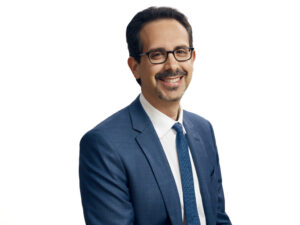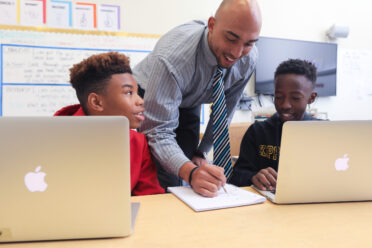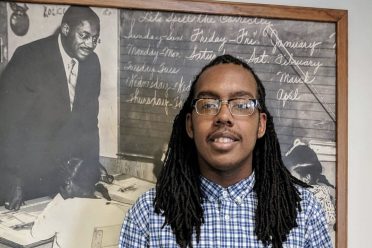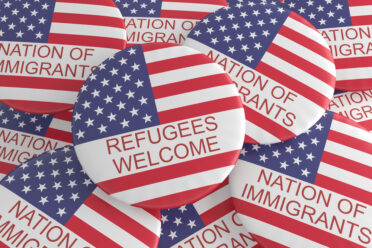Ariadne Labs’ Dr. Asaf Bitton on social distancing, connection, resilience and courage
On a sunny Friday morning in mid-March, primary care physician Asaf Bitton was looking out the window of his home and caught a glimpse of the park down the street. Children were running around and parents were smiling and chatting in groups. The normally happy scene made him cringe. This was March 13, the early days of public awareness of COVID-19. School closures were just starting. Social distancing, while advised, was neither widely understood nor routinely practiced. As a global public health expert and leader of Ariadne Labs, the doctor knew what was happening in the park could prove dangerous.

Friends and coworkers were directing lots of questions Bitton’s way about coronavirus spread, symptoms and precautions. His wife Liz urged him to write something pragmatic and approachable that would provide his best advice to answer a growing flood of questions.
So Bitton penned a piece, Social Distancing: This is Not a Snow Day, and it went up on the Ariadne Labs Medium blog late on Friday, March 13. By the next morning, more than a half million people had read it. The piece was being widely shared on Facebook and Twitter. I read it at 8 a.m. that Saturday, and, by then, several of my mom friends had already seen it. His message stopped me in my tracks as I was contemplating some friend-filled activities for my 12-year-old: No kid playdates, parties, sleepovers, or families/friends visiting each other’s houses and apartments. What?
I have known Bitton for more than five years and we have worked closely together on primary health care and other public health initiatives. After reading his essay, I stopped and re-evaluated everything I was doing. Right then. A lot of other people had the same reaction. Within a week, Bitton was being interviewed by CNN, The New York Times and public radio, and The Boston Globe published an updated version of the column. The original Medium blog has been viewed 7.6 million times and counting.
Today, Bitton continues to see patients through his primary care practice at Brigham and Women’s Hospital. He is also leading a large-scale effort at Ariadne Labs, supported by the Patrick J. McGovern Foundation, to provide protocols to all levels of the health care system. He took some time recently to talk about COVID-19. In this first of a two-part series, we talk about how his Medium essay helped drive an Ariadne Labs focus on public communication about social distancing, trauma, and resilience during the pandemic. In part two we dive deep into the work Ariadne Labs is doing to improve the delivery of health care during the COVID-19 pandemic and beyond.
What was the inspiration for your Medium essay?
On the morning after schools closed in Brookline, my wife, Liz, began receiving a slew of texts and emails from other parents asking for playdates. I remember looking outside my window, and seeing families gathering in the park as if it were a snow day or an opportunity for a social occasion. I wondered, if we shut down the schools – and our economy – but still met up in parks or bars or restaurants, what was the point of closing in the first place? My wife recommended that I write something to help parents and the public at large better understand not only how to practice social distancing, but why it matters in the first place.
What was your intention with the piece?
My goal was to lay out in clear, practical terms – from the perspective of someone who is a parent, physician, and public health expert – why social distancing is so critical in order to successfully flatten the curve. It’s an unusually stringent piece for me, but the data so clearly supported the recommendations. Within hours of posting on the Ariadne Blog, the piece had caught hold. By that evening, I was getting messages from people on the West Coast. The next morning, I was hearing from people in New Zealand and some in Israel who had translated it. Hopefully, it helped people take this more seriously and stopped a few more people from being inadvertently infected. For Ariadne, it provided us an opportunity again to be a trusted source of practical, useful information, condensed for the general public, clinicians, and health system leaders.
Well, I have barely left my house for more than a month. I’m grateful that I got that message when I did.
It’s ironic, isn’t it? I consider myself a pretty socially connective person, but this needed to be said. I was being asked, “Do you really mean NO playdates?” Yes, I really mean that! This is a serious disease. In retrospect, none of that article seems too extreme. In fact, if I had to write it again, it would be even more stringent. I still think about St. Paddy’s Day weekend in Boston when so many people partied in the bars. I don’t blame them. I just wish that the message had gone out earlier and been heeded better.
One thing I would emphasize is that this virus, unlike Ebola, and even unlike some types of flu, has a concerningly long asymptomatic window, sometimes up into double digit days, wherein a person is contagious throughout. I can’t tell you how often I’ve heard, “We’re just going to pick one family, and we know that they’re ‘clean.’” This has nothing to do with cleanliness; without widespread testing, you have no ability to determine the safety of that interaction. And we are not yet at a widespread enough level of testing.
Clearly, communications have emerged as an essential tool in this pandemic. Tell me about how you have carried that work forward more broadly at Ariadne Labs.
Early on, we saw a clear need for a trusted voice of practical, evidence-informed information. Since our founding, Ariadne has been involved in developing clinical and system-level solutions and translating them into communications for broad audiences, so it was natural that we would use that expertise to offer guidance for the public, clinicians, and health system administrators. We know from our work with serious illness that effective communication between clinicians and the public help ease fear, anxiety, and misunderstanding, and this was an opportunity to do that in response to this new public health crisis.
In the last few months, we’ve focused our response to COVID-19 on six priority areas where we believe our expertise can have the most impact: Community Mitigation, Global Response, Seniors and Vulnerable Populations, Obstetrics, Safe Surgery and Safe Systems, and Outpatient Care.
And the messages from our experts have clearly resonated. For instance, Rachel Smith, MS, PA-C, a Clinical Implementation Specialist on Ariadne’s Implementation Platform, and an Army veteran previously stationed in Iraq, wrote a powerful op-ed in STAT about lessons from her wartime duty as applied to helping health workers get through this incredibly stressful daily work situation.
Nomi Levy-Carrick, MD, MPhil, associate faculty and head of Ambulatory Psychiatry at Brigham and Women’s Hospital, has been writing a series of essays. In one of them, she calls it the personal resilience marathon and shares how as health care workers we can name what we’re going through and bolster our own resilience by intentionally focusing on what’s most important, what’s most painful, what needs to be named, and what needs to be dealt with now. In another, she talks about the need to expand our empathetic repertoire as we brace for the most intensive weeks of the COVID-19 surge.
These messages of resilience seem especially important now as we are in the midst of this pandemic.
This is such an unusual and unprecedented time – it has been fascinating to see how many of us at Ariadne come from a similar school of resilience training. One of our key messages, both internally at Ariadne and externally, is to never worry alone. Whatever you’re feeling in this time of great stress is okay. Name it, share it if you can, and process it with others. Having worry and fear doesn’t mean you’re weak; it means you are human. And courage is not the absence of fear; it’s the necessary action taken despite it. As clinicians, we can find ways to reach out to each other, and be able to carry that forward to patients, many of whom are suffering alone, finding new ways to connect with them and bolster their resilience.
Dr. Daniela Lamas, another associate faculty member who is an ICU physician, has been writing beautifully about the trauma of not being able to be with patients in the way that you used to because of this infectious challenge, and the ways to bridge the gaping and lonely divide.
I think people need to hear that: This is really painful and difficult. Whatever you are experiencing in this crisis right now is ok.
It is a key priority for us that we humanize this crisis while also humanizing the response and bolstering people’s resilience. This is not a short-term crisis, so we have to talk about how we will get through this together. But we’re not just going to write about this, we’re going to build tools to enable this form of resilience thinking.
What scares you most about this pandemic?
Three things about COVID-19 frighten me most: the numbers, the speed, and the duration. Humans are wired to think in linear ways. If I tell you that the number of people infected by COVID-19 is going to be three times greater next week, most people can conceptualize that. However, if I tell you that we’re now in logarithmic exponential thinking, and it’s on a J-shaped curve that’s going to exponentiate to the third or fourth power in two weeks, even if you’re a mathematician, that’s a very difficult thing to get one’s head around. Admittedly, it’s hard to get worried when there are 100 cases. But 100 exponentiated to the third or fourth power is an extremely dangerous phenomenon that will become a million faster than the blink of an eye.
And I’m also worried about our stamina – as communities, as individuals – to continue to take these necessary steps that are so hard, so disruptive, so isolating, so uncomfortable, for so long. When you are doing something hard but have a fixed end date, then we can tolerate a lot. But with the uncertainty of when this will end, and the likely repeat cycles of spread and then reduction of cases, people’s stamina and ability to ride this out will be tested.
We’re all connected in this. If there’s a lesson we can all take from this, it’s that we’re all connected as humans. Whether we like each other or not, we must start acting in a collective fashion. It does matter what somebody in another town or state does or doesn’t do, because without a consistent community response, COVID-19 will continue to infect others. That’s what worries me – we haven’t exactly been the most community-minded and connected of countries recently. But we need to dig down deep and find that spirit of giving and community-minded generosity to get through this unprecedented time.
What gives you hope?
I’m an optimist. After 9/11, one abiding image for me was just how many people – from firefighters and police officers to average citizens – stepped up to do the right thing in a moment of almost mind-boggling pain, personal risk and crisis. Hundreds of first responders ran into burning buildings to save people. That’s incredible. Or maybe not on second thought.
We’re seeing this now in the US, with the striking number of people who wake up every single day, ready to serve, showing up to the hospitals, working in essential services. Doctors, nurses, phlebotomists, janitors, patient aides, pharmacists, security personnel – everyone who works in the hospital – millions of people acting selflessly every day doing their job even though they know how risky every health care setting is right now.
Our system depends on health care workers and essential hospital personnel continuing to show up, because if they don’t, the system falls apart, and we won’t be able to be the backstop for populations that are getting sicker and sicker.
In addition to health care workers, there’s an incredible story of the basic decency of most people and their ability to respond to a crisis – from people checking in on the elderly in their communities who are isolated, supporting small businesses, workplaces not firing their employees even though they have no cash flow, and so many more examples. I hope we can create a new social compact after this that says, since we’re all in this together, why don’t we all treat each other better, as a matter of course, pragmatism, and basic dignity?
My hope is that the health care system will emerge from COVID-19 as a better and more resilient version of itself, with increased efficiencies and fewer disparities. We can learn so much from this experience that can make us stronger in the future – from virtualized medicine to overall pandemic preparedness. We will have a vaccine one day, and we’ll have effective treatments to share.
Courage, connection, consideration for each other, those are things that give me a lot of hope in these dark days.


